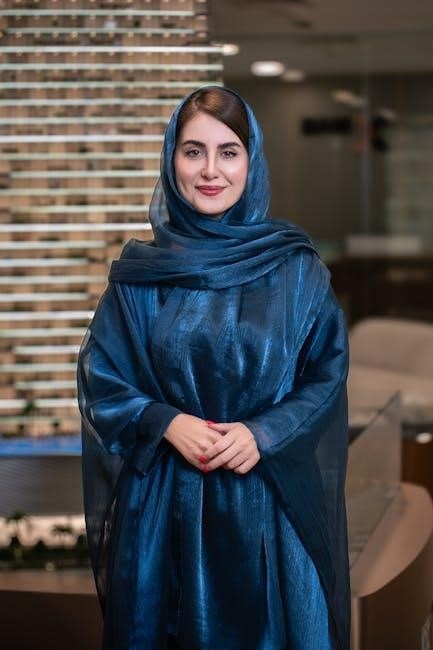Arabic plays a vital role in business affairs‚ especially in regions with growing economic influence. Resources like Sylvie Chraïbi’s “L’Arabe des Affaires pour les Nuls” provide essential tools for professionals seeking to navigate Arabic-speaking markets effectively.
1.1. Overview of the Role of Arabic Language in Business Communication

Arabic is indispensable in business communication across the Arab world‚ facilitating negotiations‚ document preparation‚ and cross-cultural interactions. Its precision in legal and financial terminology ensures clarity in contracts and agreements. Chraïbi’s work emphasizes mastering business-specific vocabulary and cultural nuances‚ enabling professionals to build trust and collaborate effectively. Arabic’s formal structure and rich expressions make it a cornerstone of professional communication in the region‚ essential for successful business operations and diplomatic relations.
1.2. The Growing Relevance of Arabic in Global Trade and Diplomacy
Arabic’s importance in global trade and diplomacy is expanding rapidly‚ driven by the economic rise of Arab nations and their influence in international organizations. As a language of diplomacy‚ Arabic facilitates communication in forums like the League of Arab States and the United Nations. Its role in trade agreements‚ international law‚ and cultural exchanges underscores its growing relevance. Resources like Chraïbi’s “L’Arabe des Affaires pour les Nuls” highlight the need for professionals to master Arabic for effective global engagement and negotiation.

Key Concepts in Arabic Business Language
Mastering Arabic business language involves essential vocabulary‚ phrases‚ and cultural insights for professional interactions. Key concepts include terms for meetings‚ negotiations‚ and formal documents‚ as outlined in resources like Chraïbi’s work‚ ensuring effective communication in Arab business environments.
2.1. Vocabulary and Phrases for Business Meetings and Negotiations
Mastering key vocabulary and phrases is crucial for effective business communication in Arabic. Essential terms include greetings‚ meeting scheduling‚ and negotiation strategies. Phrases like “تارك اللقاء” (scheduling a meeting) and “مناقشة العقد” (discussing a contract) are fundamental. Additionally‚ understanding financial terms such as “الميزانية” (budget) and “الربح” (profit) is vital. Chraïbi’s resources emphasize practical expressions for professional interactions‚ ensuring clarity and confidence in business settings.
- Meetings: Phrases like “تارك اللقاء” (scheduling a meeting) and “الاجتماع السنوي” (annual meeting).
- Negotiations: Terms like “مناقشة العقد” (discussing a contract) and “التوصل إلى اتفاق” (reaching an agreement).
- Formal Greetings: Expressions such as “السادة” (ladies and gentlemen) and “مرحبا” (hello).
- Financial Terms: Vocabulary like “الميزانية” (budget) and “الربح” (profit).
Chraïbi’s work highlights these elements to facilitate professional interactions in Arabic-speaking business environments.
2.2. Essential Documents and Terminology in Arabic Business Contexts
Understanding essential documents and terminology is vital for conducting business in Arabic-speaking regions. Key documents include العقود (contracts)‚ الفواتير (invoices)‚ and دفاتر الاجتماعات (meeting minutes). Important terms like الميزانية (budget)‚ الربح (profit)‚ and الخسارة (loss) are frequently used. Chraïbi’s resources emphasize mastering these elements to ensure clear and professional communication in business settings.
- Contracts: Legal agreements outlining terms and conditions.
- Invoices: Documents detailing transaction amounts and details.
- Meeting Minutes: Records of discussions and decisions made.
These documents and terms are fundamental for navigating Arabic business environments effectively.
The Contribution of Sylvie Chraïbi to Arabic Business Language
Sylvie Chraïbi‚ a renowned expert‚ revolutionized Arabic business language through her book L’Arabe des Affaires pour les Nuls‚ providing essential tools for professionals in Arabic-speaking markets.
3.1. Overview of “L’Arabe des Affaires pour les Nuls”
L’Arabe des Affaires pour les Nuls by Sylvie Chraïbi is a comprehensive guide tailored for professionals and students aiming to master Arabic in business contexts. The book focuses on practical vocabulary‚ essential phrases‚ and real-life scenarios‚ making it an invaluable resource for navigating Arabic-speaking markets. It emphasizes immersive learning‚ leveraging authentic documents and situational examples to enhance proficiency. Designed for both beginners and advanced learners‚ it equips users with the linguistic tools needed to excel in business communication‚ ensuring clarity and effectiveness in professional interactions.
3.2. Chraïbi’s Approach to Teaching Business Arabic
Sylvie Chraïbi’s approach to teaching business Arabic emphasizes practicality and immersion. She focuses on real-life scenarios‚ such as business meetings‚ negotiations‚ and professional interactions‚ to help learners master the language in context. Her method combines essential vocabulary‚ phrases‚ and cultural insights‚ ensuring learners understand both the language and its business nuances. By blending interactive exercises with authentic materials‚ Chraïbi equips students with the tools to communicate effectively in Arabic-speaking professional environments‚ fostering confidence and competence in global business settings.

Challenges in Learning Arabic for Business Purposes
Mastering Arabic for business involves complex vocabulary‚ cultural nuances‚ and dialect variations‚ requiring dedicated study to navigate professional contexts effectively and avoid misunderstandings.
4.1. Difficulties in Mastering Business-Specific Vocabulary
Learning Arabic business vocabulary presents unique challenges due to its complexity and nuance. The language’s rich dialect variations and specialized terms require precise understanding. Business Arabic often involves intricate financial and legal jargon‚ which can be daunting for non-native speakers. Additionally‚ the need to adapt to regional dialects and industry-specific expressions adds to the difficulty. Resources like Sylvie Chraïbi’s “L’Arabe des Affaires pour les Nuls” provide structured guidance‚ but mastering these terms demands consistent practice and cultural context awareness. The complexity of Arabic script and grammar further intensifies the challenge‚ making it essential for learners to immerse themselves in real-world business scenarios to achieve fluency.
4.2. Cultural Nuances in Arabic Business Communication
Cultural nuances play a crucial role in Arabic business communication‚ requiring an understanding of regional customs and social etiquette. Building trust and personal relationships is essential‚ as Arabs often prioritize interpersonal connections in business dealings. Hospitality‚ respect‚ and hierarchical structures are deeply ingrained‚ influencing how negotiations and meetings are conducted. Non-verbal cues‚ such as hand gestures and eye contact‚ carry significant weight. Additionally‚ the formal nature of Arabic communication demands precision in language and tone. These cultural aspects highlight the importance of adaptability and sensitivity in cross-cultural business interactions.
The Role of Arabic in International Affairs
Arabic is a key language in international diplomacy‚ serving as an official language in organizations like the United Nations and the Arab League‚ facilitating global dialogue and cooperation.
5.1. Arabic in Diplomatic Communication
Arabic holds significant importance in diplomatic communication‚ particularly within international organizations like the United Nations and the Arab League. As one of the UN’s official languages‚ Arabic facilitates dialogue among member states‚ ensuring diverse perspectives are represented. In diplomatic settings‚ precise translation and cultural sensitivity are crucial‚ as misunderstandings can impact global relations. Sylvie Chraïbi’s work emphasizes the need for accurate business Arabic to navigate diplomatic interactions effectively‚ reflecting the language’s role in fostering international cooperation and understanding.
5.2. The Use of Arabic in International Organizations
Arabic is widely utilized in international organizations such as the United Nations and the Arab League‚ where it serves as an official language. This reflects its importance in fostering global communication and cooperation. Organizations often rely on accurate translations and interpreters to ensure clarity in diplomatic and economic discussions. Sylvie Chraïbi’s resources highlight the necessity of mastering business Arabic for professionals engaging with these entities‚ emphasizing the language’s role in bridging cultural and linguistic gaps in international affairs.

Case Studies in Arabic Business Communication
Case studies reveal successful business negotiations and cross-cultural interactions in Arabic-speaking regions. Sylvie Chraïbi’s insights highlight the importance of understanding cultural nuances in business communication.
6.1. Successful Business Negotiations in Arabic-Speaking Countries
Successful business negotiations in Arabic-speaking countries often hinge on understanding cultural norms and language nuances. Sylvie Chraïbi’s work emphasizes the importance of preparation for meetings and appointments‚ highlighting phrases and vocabulary essential for professional interactions. Case studies from Tunisia and Morocco demonstrate how effective communication fosters trust and collaboration. Chraïbi’s practical guides provide insights into navigating cross-cultural exchanges‚ ensuring seamless business operations in diverse Arabic-speaking regions.
6.2. Examples of Effective Cross-Cultural Communication
Effective cross-cultural communication is crucial in Arabic-speaking business environments. Sylvie Chraïbi’s guides highlight practical strategies‚ such as understanding cultural nuances and using appropriate business terminology. For instance‚ the Sino-Arab Business Forum in Tunis exemplifies successful cross-cultural interactions‚ where Arabic language proficiency facilitated collaboration. Chraïbi’s insights help professionals navigate these dynamics‚ ensuring respectful and productive exchanges that bridge cultural gaps and foster long-term business relationships in diverse Arabic-speaking regions.
Resources for Learning Arabic Business Language

Sylvie Chraïbi’s “L’Arabe des Affaires pour les Nuls” is a leading resource‚ offering practical vocabulary and phrases for business professionals. Online platforms like Larabe des Affaires provide interactive tools and guides tailored for learners seeking to master Arabic business communication effectively.
7.1. Recommended Books and Guides
Sylvie Chraïbi’s “L’Arabe des Affaires pour les Nuls” is a top recommendation‚ offering immersive learning for business professionals. It covers essential vocabulary‚ phrases‚ and cultural insights for effective communication in Arabic-speaking markets. Additional resources include “L’Arabe aux Concours des Grandes Écoles” by Chraïbi‚ focusing on advanced language skills for competitive exams. Online platforms like Larabe des Affaires provide interactive tools and authentic documents‚ such as business letters and reports‚ to enhance practical learning. These resources are tailored for professionals and students aiming to master Arabic for business purposes.
7.2. Online Tools and Platforms for Business Arabic
Online tools like Flashcardo offer interactive Arabic business vocabulary flashcards‚ ideal for quick learning. Platforms such as Larabe des Affaires provide comprehensive resources‚ including interactive exercises and authentic business documents. These tools cater to professionals and students‚ offering tailored lessons for mastering business Arabic efficiently. They incorporate immersive learning techniques‚ ensuring practical skills for real-world applications.

The Evolution of Arabic Business Language in the Digital Age
Digital tools and resources‚ like Chraïbi’s guides‚ have transformed business Arabic learning‚ offering accessible platforms for professionals to master language skills essential for modern business communication.
8.1. Impact of Technology on Business Communication in Arabic

Technology has revolutionized Arabic business communication‚ enabling faster and more precise interactions. Digital tools‚ such as translation apps and online platforms‚ facilitate language learning and real-time interpretation. E-learning resources‚ including Sylvie Chraïbi’s guides‚ provide accessible methods for mastering business Arabic. Social media and professional networks also enhance connectivity‚ fostering cross-cultural collaborations. These advancements ensure that Arabic remains a vital tool in global business‚ bridging gaps between cultures and markets efficiently.
8.2. The Role of Social Media in Arabic Business Interactions
Social media has become a cornerstone of Arabic business interactions‚ fostering connectivity and collaboration. Platforms like LinkedIn and Twitter enable professionals to network and share insights‚ while Instagram and Facebook facilitate brand promotion in Arabic-speaking markets. The use of Arabic in these spaces ensures cultural relevance‚ helping businesses build trust and engagement. Additionally‚ social media tools provide resources for learning business Arabic‚ such as videos and tutorials‚ further enhancing professional communication in the region.
Arabic’s significance in business affairs continues to grow‚ supported by resources like Sylvie Chraïbi’s “L’Arabe des Affaires pour les Nuls‚” fostering professional interactions and cultural understanding effectively.
9.1. Summary of Key Points
By focusing on practical language immersion‚ Chraïbi’s approach bridges the gap between linguistic proficiency and professional efficacy‚ enabling learners to navigate the complexities of Arabic business communication effectively.
9.2. Future Prospects for Arabic in Business Affairs
The importance of Arabic in business affairs is expected to grow‚ driven by expanding global trade and diplomacy in Arab-speaking regions. As a key resource‚ Sylvie Chraïbi’s “L’Arabe des Affaires pour les Nuls” will remain vital for professionals seeking to master business communication in Arabic. The increasing demand for Arabic language skills in international business underscores its future relevance‚ supported by advancements in technology and cultural exchange programs.
